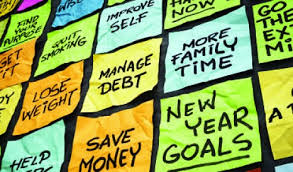
How to Make Self-Compassionate Resolutions for 2020
Most of us are back at work by this point in January and already the holidays are starting to feel like they’ve been over for a while. In our street, every day the pile of Christmas trees assigned to the garbage grows bigger. It’s hard to imagine that a few days ago they were taking pride of place loaded down with all kinds of treats and surrounded by presents.
Perhaps while you were enjoying your holiday downtime, you were thinking about the new year about to start. Maybe you’ve made a whole list of new year resolutions. It seemed a good idea at the time—make a fresh start to the year and get yourself in shape. The thing is, we can get a bit carried away. We make a huge list of all the things we are going to stop doing and all the things we think we should start doing and when we come to look at it—well, it’s a bit overwhelming and frankly, depressing!
When we are not self-compassionate
Now we have set up the perfect conditions for feeling guilty and dissatisfied with ourselves. The next step is to start beating ourselves up for not getting going on the self-improvement plans we made—which will make us feel worse. It’s easy to look back over the year just finishing and remember all the things we didn’t do, or hopes we had that were not fulfilled.
Of course, there is nothing wrong with wanting to get the best out of ourselves, nor with using the beginning of a new year as a time for reflection on how we are living our lives. The thing is we tend to go about it in such a self-critical way.
We look at everything we think is not working so well and then make a long to-do list of all the ways we want to change. Somehow, we are surprised when it is overwhelming and we cannot keep it up. We feel as if we have failed in some way and are disappointed in ourselves.
Some suggestions for making self-compassionate resolutions
Not surprisingly, we are much more likely to get the best from ourselves if we approach any changes we want to make with an attitude of self-compassion and kindness. We can try and be a friend to ourselves, rather than behaving like our worst nightmare of a disapproving schoolteacher.
-
Start off with looking to your strengths
Think about the parts of your life that are on track and the things you do well. Ask yourself how you could build on that.
For example: you might be good at your job but have an irritating relationship with a work colleague. Your resolution could be to try to make a difference in how you both relate to one another. Start small by making them a cup of coffee whenever you can. The chances are you’ll be surprised how quickly they warm up to you. It often does not take so much to make a difference.
-
Choose the changes you want to make carefully
When looking for where you want to change, choose something manageable. You can see from the picture above that ‘improving self’ is a big project, as is ‘save money’. Both are too big and too general.
Even ‘more family time’ is asking a lot. Instead try to be specific—decide to call your mother twice a week; or decide to turn off all your individual screens (phone, tablet etc.) by 9pm in the evening in order to have quality time with your partner.
-
Set yourself some attainable goals
It takes time to change your habits, so take big picture into account. Set yourself a goal—like making meditation part of your life but then look at the steps needed to get there. Decide to meditate for five minute every day for two weeks. If that goes well, then try for 10 minutes every day for a month. When you miss a day, don’t stop to berate yourself—just carry on the next day.
-
Celebrate your successes
If you had a good friend who was trying to change some habits you would want to encourage them. Remember, with self-compassion you can be a good friend to yourself. Celebrate every success you achieve. Build in rewards for what you accomplish. When you manage your first week of meditating 5 minutes a day then you could celebrate by giving yourself a treat.
-
We are all in the same boat.
Whatever our situation and circumstances, people mostly want to be happy and live good lives. Think of all the people who are trying to make positive changes and struggling with them just like you are. None of us is alone in trying to find the way to get the best out of ourselves and live a meaningful life.
-
Allow yourself to get it wrong
No-one is perfect and it’s a waste of effort to even try. As human beings, we are sometimes going to make mistakes and sometimes we will be brilliant. When you break a resolution, or find yourself slipping back into old habits instead of beating yourself up, try forgiving yourself. Focus on the effort you’ve been making and don’t give up on what you are trying to do just because you had a bit of a blip. Remember to talk to yourself as you would to a good friend. If your friend was struggling with their resolution—how would you talk to them? Would you call them a loser? I doubt it. After all—if we cannot be a friend to ourselves, how can we be a good friend at all?
If you enjoyed this article you might like to check out this online course on self-compassion How to Be a Good Friend to Yourself




